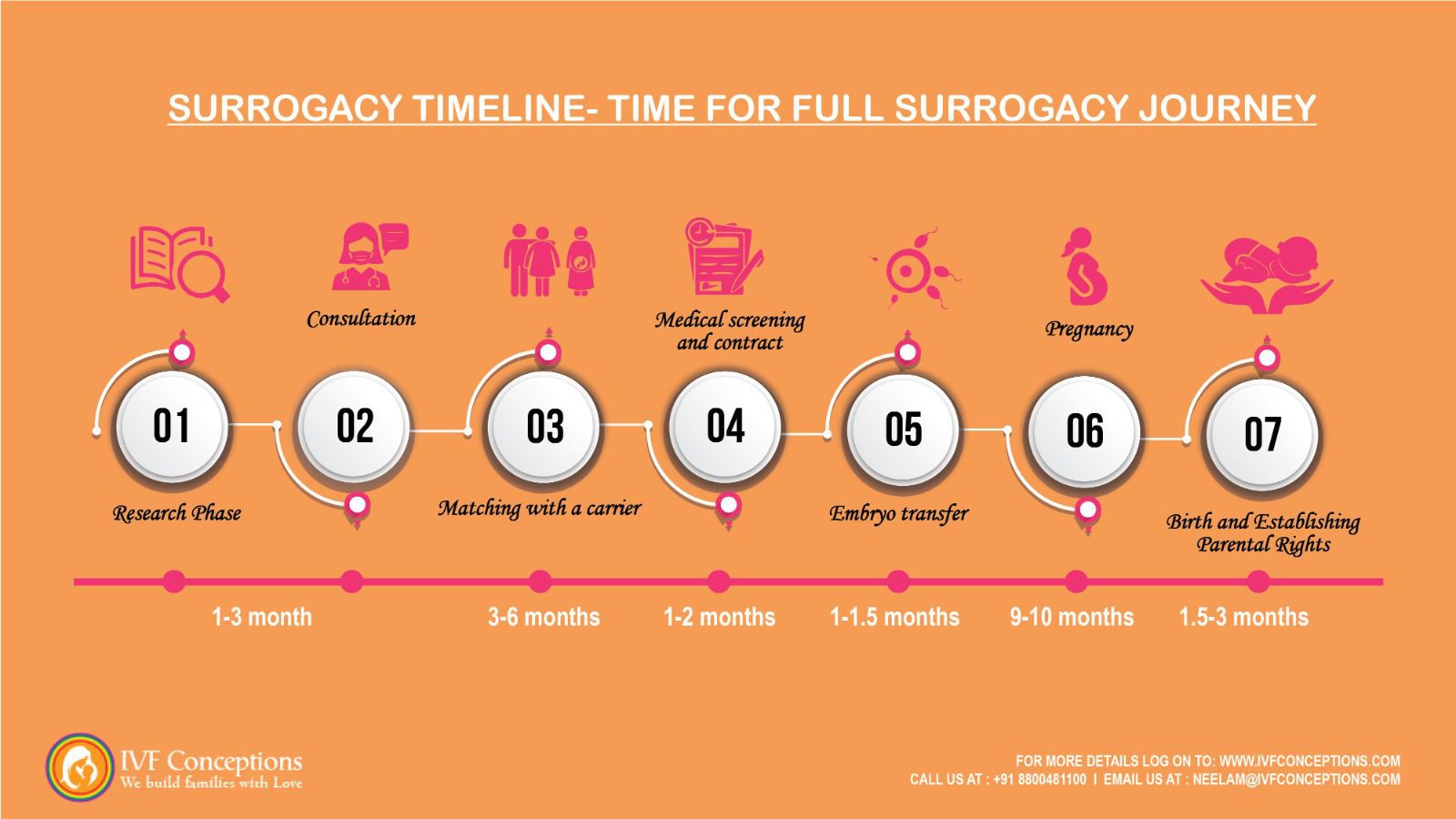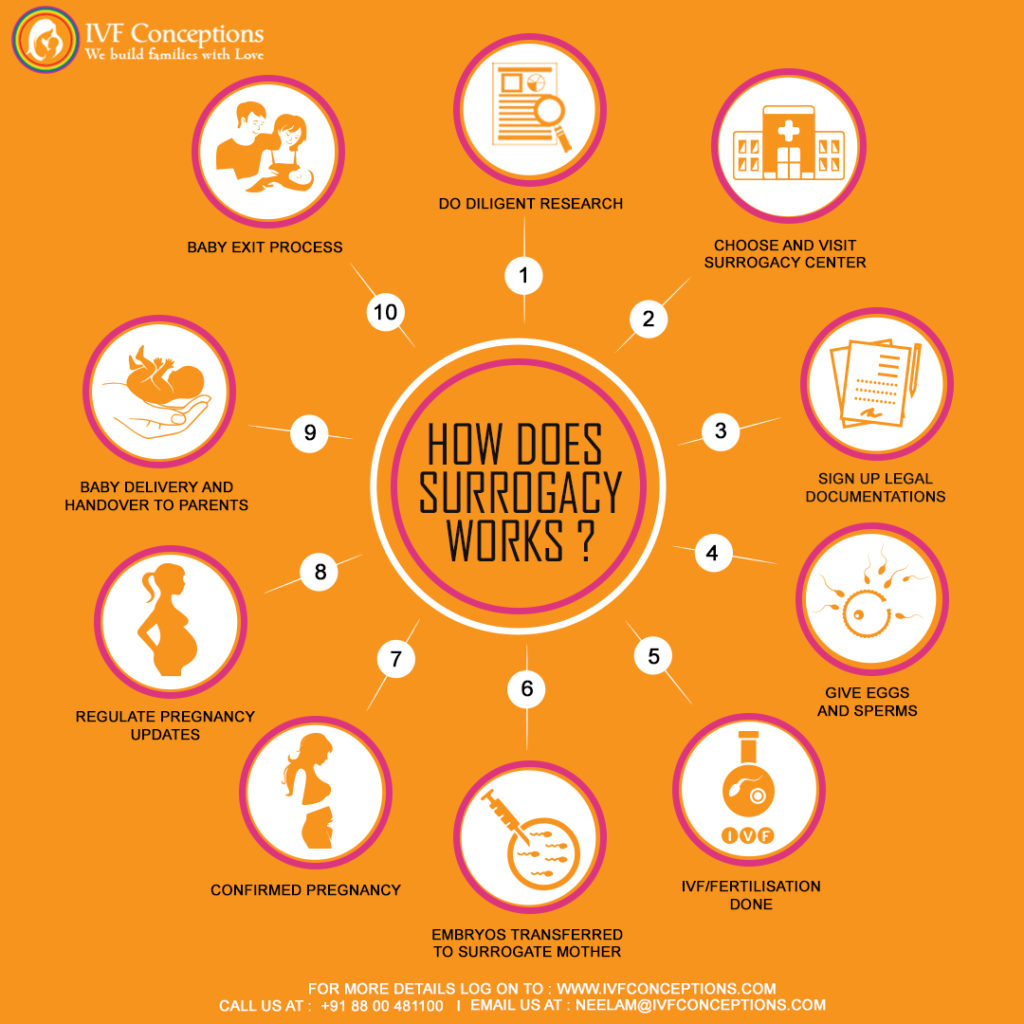Knowing how long the surrogacy process takes, helps intended parents to plan a successful surrogacy journey.
When couples choose the path of surrogacy to fulfill their dreams of having a baby, the burning question on their minds is often, “How long will the surrogacy process take?” At IVF Conceptions, we understand the eagerness to embrace a newborn and welcome them into your loving home. We are here to guide you through this incredible journey, providing you with a detailed and transparent outline of the surrogacy timeline.
Without a doubt, gestational surrogacy is a long and tedious process. But some people are fortunate enough to get through quickly through this process. While some would-be parents may take more than twice the time required for the same process. Let’s discuss in brief typically how long does surrogacy process takes.
The surrogacy process takes 18 months to 24 months depending upon the individual circumstances. In this article, we will discuss all are factors that affect the duration of a typical surrogacy journey.
 Here is an outline of the surrogacy process timeline for intended parents:
Here is an outline of the surrogacy process timeline for intended parents:
| Stage | Description of Stage | Duration |
| Research Phase | Explore family-building options and decide on surrogacy. | Personal timeframe |
| Consultation and Application | Choose a surrogacy agency, sign an agreement, and start embryo creation (if needed). | 1-3 Months |
| Matching | The agency finds and presents potential gestational carriers. Meet and decide on a match. | 3-6 Months |
| Medical Screening and Contracts | Carrier undergoes medical and psychological screening. Sign a surrogacy contract. | 1-2 Months |
| Embryo Transfer | Prepare for embryo transfer. Success may take multiple attempts. | 1-1.5 Months |
| Pregnancy | Gestational carrier’s pregnancy, approximately 40 weeks. | 9-10 Months |
| Birth and Postpartum | Baby’s birth, parental rights, and the postpartum period. | 1.5-3 Months |
What are the different kinds of surrogacy?
Between gestational and traditional surrogacy, there is a very important distinction. The mother has no genetic connection to the infant she is carrying in gestational surrogacy. The method of surrogacy involves fertilizing the intended father’s sperm (or sperm donor) with the intended mother’s egg (or egg donor) to form an embryo through in vitro fertilization.
The surrogate’s own egg is fertilized by artificial insemination in traditional surrogacy, and the surrogate is both the carrier and the biological mother of the surrogate baby.
Types of surrogacy agreements
There are two types of surrogacy agreements –
- Altruistic surrogacy– Altruistic surrogacy applies to those surrogacy arrangements where no monetary compensation is offered to the surrogate. The mother is a close relationship with the planned parents in most altruistic surrogacy arrangements. The surrogate can be a relative or a family friend. Surrogacy in the UK, Canada, and Australia is altruistic surrogacy.
- Commercial surrogacy – In addition to paying medical costs, etc., a commercial gestational surrogacy arrangement provides a fixed monetary compensation to the surrogate, this is known as surrogate mother compensation. In Georgia Ukraine, and the USA (some states), commercial surrogacy is allowed legally.
Read more:
Which are the best countries for surrogacy?
Best International surrogacy country for single and gay couples
Pros and cons of surrogacy that parents must know
Surrogacy Process Timeline For Intended Parents
The average time for a surrogacy process is generally 15 to 24 months but it varies from case to case. So, before answering this question, one needs to understand that surrogacy is not a straightforward procedure.
It involves lots of steps and stages like:
- Deciding whether surrogacy is the right choice,
- Going through the screening processes,
- Finding a match
- Fulfilling the legal aspects
- The medical procedure of IVF or IVF with an egg donor
- Preparing for the transfer process and other things
Therefore, we can say that it is a long process with many parties involved at each step. Various factors can influence the length of the surrogacy cycle, but the location of a suitable surrogate usually takes around four to six months.
Understanding the Surrogacy Process Timeline in Nutshell
The surrogacy process is a unique and complex journey that involves intended parents, surrogates, medical professionals, and legal experts. It allows those unable to carry a pregnancy to have a child of their own, with the help of a gestational surrogate who selflessly carries the baby to term. But, you might wonder, how long does this heartwarming journey take? Let’s explore the various stages of the surrogacy process and find out the estimated timelines for each step.
Initial Steps: Building a Strong Foundation (30 – 60 days)
The first leg of the surrogacy journey commences with the application and consultation phase. As intended parents, you will complete an application that undergoes careful review by our agency. We then schedule a consultation to engage in meaningful discussions about your requirements, expectations, and any questions you may have.
Finding the Perfect Match: The Bonding Process (30 – 120 days)
Selecting the right surrogate is a momentous step in the surrogacy process. The matching process may vary in duration, with some matches achieved swiftly and others requiring additional meetings to find the perfect fit. Rest assured, we are committed to supporting you throughout this pivotal phase.
Surrogate Screening and Legal Process: Ensuring a Smooth Journey (45 – 60 days)
Upon confirming your preferred surrogate, the agency proceeds with medical screening to evaluate her ability to carry a child successfully. A comprehensive physical and psychological assessment is conducted to ensure that she is ready to embrace the responsibilities of surrogacy wholeheartedly.
The legal team works diligently to draft a comprehensive contract that outlines the rights and responsibilities of all parties involved.
The IVF Procedure: Embarking on the Pregnancy Journey (60 – 90 days)
With all preparations in place, the fertility clinic initiates the In Vitro Fertilization (IVF) process. The surrogate undergoes a cycle of medications to prepare her body for pregnancy. During the IVF procedure, fertility specialists carefully implant embryos. Within approximately 15 days, the first results become evident.
Pregnancy and Preparing for Parenthood (240 – 280 days)
Successful embryo implantation marks the beginning of an extraordinary pregnancy journey. As the surrogate carries your child, we celebrate this momentous occasion with you. Approximately between 16 to 20 weeks into the pregnancy, our legal team commences the process of obtaining a pre-birth order and establishing your legal parentage.
As each surrogacy case is unique, the exact duration of the journey may vary. However, based on our experience, we can confidently estimate that the surrogacy process takes about 15 to 18 months to reach its heartwarming conclusion.
Factors determining how long does surrogacy process take
The time of surrogacy can differ based on different factors-
- Your professional’s advertisement, matching, and screening resources and the number of surrogates they are currently working with.
- The surrogacy’s ambitions, objectives, and desires can ease or prolong the matching process.
- Amount of cycles and embryo transfers required to achieve pregnancy successfully.
- Legal services are available in your specific situation and many more.
- Cross-border surrogacy is much quicker as the surrogacy agency has pools of egg donors and surrogate mothers ready to be matched immediately. On top of that, other legal processes take less time due to the already established surrogacy process.
More resources on the topic of the surrogacy process:
How does the surrogacy process work?
All about surrogacy cost with the breakdown
All about the gay surrogacy process
 Conclusion
Conclusion
Therefore, it might take the time of at least one to two years in the planning and execution of the process of surrogacy until childbirth.
Intended parents need to know that each surrogacy journey is different and the total time depends on many factors. Some of them are out of your hands and even out of the fertility clinic’s hands. However, if you are sure that gestational surrogacy is your only way of becoming parents, then taking the plunge sooner rather than later is good.
Contact as many surrogacy professionals as possible and understand the dynamic of the surrogacy process and the cost of your case.
If you’d like to learn more about IVF, Egg Donation, or surrogacy services globally, check out the rest of our website at IVF Conceptions.
Our team has over 13 years of experience facilitating surrogacy arrangements, egg donation, and serving as an advocacy resource for infertile couples and LGBTQ individuals seeking to build families.
Our founder and chief surrogacy consultant, Neelam Chhagani, passionately helps couples struggling with fertility challenges. Since starting our surrogacy consulting agency in 2013, we’ve helped welcome over 500 babies for intended parents nationwide.
Our team includes experts from diverse backgrounds with leading reproductive attorneys, professionally trained top fertility doctors, former surrogacy case managers, experienced and kind surrogate mother and egg donor coordinators, mental health professionals specializing in infertility counseling, and a logistic support team to assist you in your chosen surrogacy country.
FAQ – How Long Does the Surrogacy Process Take
1. How long does the surrogacy process take?
The surrogacy process can vary in length, but on average it takes around 12 to 18 months from the initial steps to the birth of the baby. However, it’s important to note that every surrogacy journey is unique and can be influenced by various factors.
2. What is the role of a surrogate in the surrogacy process?
A surrogate, also known as a gestational carrier, is a woman who carries the intended parent’s embryo to term. The surrogate does not have a genetic connection to the child, as the embryo is typically created using the intended parents or a donor’s genetic material through in vitro fertilization (IVF).
3. How long does it take to match with a surrogate?
The time it takes to match with a surrogate can vary. It depends on factors such as the availability of surrogates, the specific requirements of the intended parents, and the policies of the surrogacy agency or fertility clinic involved. It can range from a few weeks to several months.
4. What is the legal process involved in surrogacy?
The legal process for surrogacy involves establishing the parentage of the intended parents and terminating any rights of the surrogate. This process can include drafting and signing a surrogacy contract, obtaining a pre-birth order or other legal documents, and ensuring that all parties involved comply with the applicable surrogacy laws.
5. Can the surrogacy process take longer?
Yes, the surrogacy process can take longer in certain situations. Factors such as the complexity of the case, the availability of surrogates, the need for additional medical procedures, and potential legal challenges can contribute to a longer timeline.
6. How does the IVF treatment fit into the surrogacy process?
IVF treatment plays a crucial role in the surrogacy process. It involves the retrieval of eggs from the intended mother or an egg donor, fertilizing those eggs with sperm from the intended father or a sperm donor, and creating viable embryos. These embryos are then transferred to the surrogate’s uterus during the embryo transfer procedure.
7. What are some milestones in the surrogacy journey?
Some key milestones in the surrogacy journey include finding a suitable surrogate, completing the medical and psychological screening, undergoing the IVF process, and achieving successful implantation of the embryo.




 Conclusion
Conclusion
